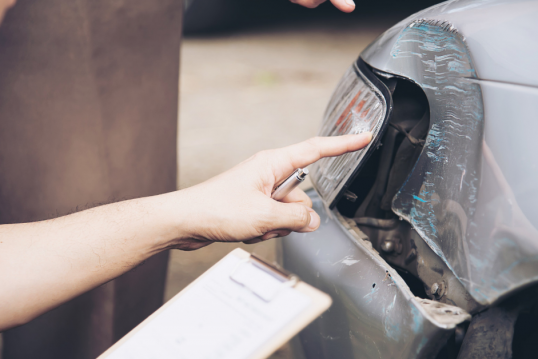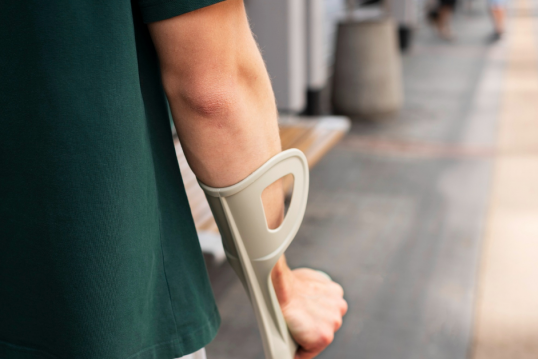Las Vegas is one of the most visited cities in the world, and more tourists than ever are choosing short-term rentals like Airbnb and Vrbo over traditional hotels. These rentals offer numerous advantages over hotels, but some properties also have hidden dangers that can put guests at risk. Hazards like broken staircases, unsafe balconies, defective furniture, and poorly maintained pools can cause accidents and severe injuries.
If you’ve recently been injured at an Airbnb or other short term rental property in Las Vegas, you likely have several legal questions. Is the property owner responsible? Does Airbnb or another platform share liability? How does insurance coverage come into play?
These cases fall under Nevada’s premises liability laws. Determining liability for a short-term rental injury requires a thorough investigation, legal knowledge and experience, and quick action to preserve evidence. The Cottle Firm has extensive experience representing tourists and residents injured in unsafe short-term rental properties across Las Vegas. Contact our Las Vegas short-term rental injury lawyers today at 702-722-6111 to discuss your case and learn about your legal options in a free consultation.
Common Hazards in Short-Term Rentals
Not every Las Vegas short-term rental is maintained to the same standard as a hotel or casino. Property owners sometimes cut corners on upkeep, fail to follow building codes, or simply overlook dangerous conditions. Unfortunately, these oversights can cause severe injuries to guests who expected a safe place to stay. Here are some of the most common hazards in Airbnb’s and other vacation rentals.
Slips, Trips, and Falls
Property owners have a legal duty to keep their premises free of hazards that could cause guests to slip or trip and fall. Common tripping includes loose carpeting, cracked floor tiles, uneven steps, and broken railings. Inadequate lighting on staircases or outdoor walkways also increases the risk of serious falls. Guests who trip or slip and fall may suffer serious injuries like broken bones and head injuries.
Balcony and Deck Accidents
Many Las Vegas rentals have balconies with views of the Strip or backyard decks. If these structures are poorly built or not properly maintained, they can collapse or fail to provide adequate support. Hazards like missing guardrails or unstable flooring put guests at risk of life-threatening falls.
Pools and Hot Tubs
Backyard pools and hot tubs are popular features in rental homes. Property owners have a legal duty to make sure these features are safe for use. Dangers like a lack of fencing, defective pool equipment, poorly maintained water systems, and slippery surfaces can all cause accidents and serious or even fatal injuries.
Defective or Dangerous Furniture
Short-term rentals may contain second-hand or old, unstable furniture. Collapsing chairs, wobbly tables, and broken beds can cause unexpected and serious injuries to guests.
Fire and Electrical Hazards
Lack of proper fire safety measures can have devastating consequences. Property owners are legally obligated to keep their properties free of hazards like faulty wiring, overloaded outlets, missing smoke detectors, or improperly maintained appliances.
Who Is Responsible? Host vs. Platform Liability
Determining liability for a short-term rental injury can be complex. Depending on the circumstances, both the host who owns or manages the property and the platform that facilitated the booking could be held responsible. In some cases, multiple parties may share responsibility.
Property Owner or Host Liability
The property owner, often referred to as the “host,” is usually the first party evaluated in a short-term rental injury case. Under Nevada premises liability law, hosts have a legal duty to maintain the property in a reasonably safe condition and warn guests about known hazards. If a guest is injured because the host ignored a dangerous condition, the host can typically be held liable for negligence.
Airbnb and Other Platform Liability
Platforms like Airbnb and Vrbo attempt to limit their liability through terms of service agreements. Generally, they act as intermediaries, not property managers. However, these companies do offer insurance coverage, such as Airbnb’s host liability insurance, which offers up to $1 million in coverage for injuries. While the platform itself may not be directly responsible for negligence, its insurance policies can still be used to compensate injured guests for negligence by hosts.
Third-Party Contractors
Airbnb hosts often rely on outside services, such as cleaning crews, pool maintenance companies, and property managers. If an injury occurs due to the negligence of one of these service providers, that contractor could share responsibility. For example, if a guest suffered a chemical pool injury due to a mistake by the pool maintenance company, that company could be held liable for damages.
Insurance Considerations in Short-Term Rental Claims
After an accident in a short-term rental, many guests may assume that the property owner’s insurance or Airbnb itself will automatically cover their losses. In reality, coverage is rarely straightforward. Multiple policies may apply, or none at all, depending on the host’s arrangements and the platform’s fine print.
Homeowner’s Insurance Exclusions
Many homeowners’ insurance policies specifically exclude coverage when the property is used as a short-term rental. If the host hasn’t purchased the right type of coverage, injured guests may find the policy offers no help. Fortunately, there are usually other options for recovery.
Host Protection Insurance
Airbnb and Vrbo both provide limited liability coverage for hosts, typically up to $1 million per incident. However, this coverage is not automatic for every claim. It excludes certain situations, such as intentional acts, injuries from vehicles, or some property defects. Guests may be eligible for compensation under these programs, but only with careful documentation of the injury and the hazard that caused it.
Umbrella or Personal Liability Policies
Some property owners carry umbrella or personal liability insurance beyond their standard homeowner’s policy. These policies may offer another layer of protection for injured guests if the host has purchased them.
Travel Insurance
Injured visitors sometimes turn to their own travel insurance for immediate coverage of medical expenses. While this can help with upfront costs, injury victims may also pursue a negligence claim against the responsible party. Some travel policies may also exclude accidents caused by unsafe conditions in a rental property.
Jurisdiction & Legal Challenges for Tourists
Many short-term rental guests in Las Vegas come from out of state or abroad. When an accident happens, they may face additional hurdles like figuring out where to file a claim, what laws apply, and how platform agreements may affect their rights. A Las Vegas Airbnb injury lawyer can help tourists with these and other issues when filing a claim.
Tourists From Out of State or Abroad
Most tourists injured in short-term rentals are not Nevada residents. However, because the injury happened in Nevada, any legal action must be taken in state courts. Out-of-state and international tourists who suffer injuries when visiting Las Vegas should contact a local personal injury lawyer for assistance in filing a reclamación por lesiones personales. In many cases, the lawyer can handle the case on their client’s behalf, without the client needing to return to Las Vegas.
Choice of Law in Nevada
Accidents that happen in Nevada are governed by Nevada premises liability laws. This means property owners in Las Vegas owe the same duty of care to all visitors, whether they live in Nevada, another state, or another country. For injured tourists, it’s important to understand that your rights will be determined by Nevada statutes and case law, not the laws of your home jurisdiction.
Platform Terms of Service
Booking platforms like Airbnb often require guests to agree to arbitration or specific venue provisions buried in their terms of service. These provisions can limit where and how claims are pursued. In some cases, arbitration may be required instead of court.
Key Evidence in Short-Term Rental Cases
If you want to win a personal injury claim after an Airbnb or short-term rental injury in Las Vegas, you’ll need to prove that someone else’s negligence caused it. Strong evidence is the foundation of any personal injury case, and acting quickly can be the difference between a strong claim and one that falls apart. Rentals are often cleaned, repaired, or relisted after an incident, which makes it important to gather evidence as soon as possible. You also must file a claim within two years of your injury, according to Nevada’s statute of limitations (NRS 11.190).
Screenshots of the Listing
Online listings often show a polished version of the property, with carefully chosen photos. In some cases, the depiction of the listing may not match the actual condition of the property. For instance, a listing might highlight a “safe balcony” that later turned out to be structurally unsound. In such cases, screenshots of the listing can be used to argue misrepresentation or negligence.
Messages with the Host
Communication through Airbnb or Vrbo’s messaging system may also be relevant evidence in some cases. A host may have acknowledged a hazard, promise that a repair was scheduled, or give instructions that confirm knowledge of a dangerous condition. These exchanges can help prove that the host knew about the hazard but failed to address it.
Photos and Videos of the Hazard
Photos or videos taken immediately after the incident can be extremely powerful forms of evidence. Hazards like broken furniture, wet floors, or unsafe electrical wiring may be repaired or removed quickly after an injury. Document these conditions immediately after an injury for proof of the hazard that caused the accident and your injuries.
Medical Bills and Records
Medical documentation not only proves that an injury occurred but also connects it directly to the accident. Emergency room reports, diagnostic tests, surgical records, physical therapy notes, and other documentation build a clear picture of the harm suffered. These records also help establish the financial toll of the injury, which is necessary when calculating damages.
Witness Statements
Other guests, neighbors, or cleaning staff may have seen the dangerous condition or the accident itself. Their statements can corroborate the injured guest’s story and show that the hazard was obvious and should have been addressed by the host.
Expert Testimony
In some cases, experts can strengthen a personal injury claim. For instance, engineers or building inspectors could testify that a balcony failed to meet Nevada building codes, or that a pool did not comply with safety standards. Their professional assessments carry weight in negotiations and in court.
Discuss Your Case With a Las Vegas Airbnb Injury Lawyer
At the Cottle Firm, we know how to handle the unique challenges of short-term rental injury claims. We understand the difficulties that tourists face when they’re far from home, and we are committed to protecting your rights. If you’ve been injured in an Airbnb or short-term rental in Las Vegas, don’t wait for evidence to disappear or deadlines to run out. Call the Las Vegas short-term rental injury lawyers of the Cottle Firm today at 702-722-6111 for a free consultation.
Relacionado:
Hurt in Vegas but Live in CA/AZ/UT? How to Pursue a Nevada Claim From Home
Rental Car Accidents in Nevada: Insurance Layers, LDWs & Cross-State Claims
Negligent Security at Casinos, Hotels & Nightclubs: Assault & Third-Party Crime Claims









